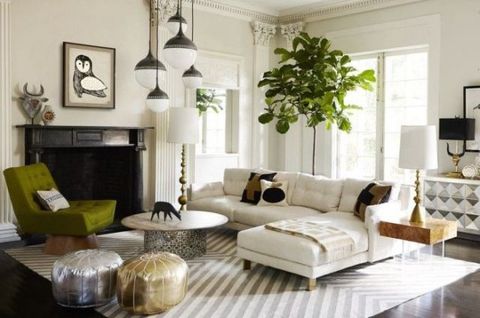Pictures Of Dining Room Lights

From left to right: Rio multi-arm chandelier £2285, Harlequin floor lamp £500, Harlequin table lamp £290, Pablo table lamp £580, all Jonathan Adler
Interior designer and TV presenter Julia Kendell gives her advice on lighting a room.
A well-balanced lighting scheme will bring a room to life. Lighting not only creates a mood but can also be used to delineate areas, enhance texture and highlight special features. The following key tips will help you create a clever lighting layout that will transform your home.
1. TAKE TO TASK
Prioritise the function of each room when you're planning a lighting scheme. In kitchens, position the lights directly over the work surfaces. Choose daylight lamps for study areas and install several circuits in spaces used day and evening. Consider where the family will be reading or doing hobbies and position lights accordingly. In a bathroom, use wall lights either side of a mirror to illuminate the face for putting on make-up and shaving. In addition to this, a dimmable circuit option will create a relaxing atmosphere, ideal for when you're having a long soak in the bath.
2. THINK IN 3D
The textures in a room come to life when light fittings are installed at an acute angle to the surface. So, to achieve this effect, rather than using overhead lighting, layer it to cast differing levels of light from floor to ceiling. For instance, you could install small directional lights on stairs to highlight treads and risers, but be aware that angled lighting will emphasise any uneven surfaces you may wish to disguise.

3. ACCENT AND DEFINE
Light can be used to draw attention to architecturally interesting details and away from less attractive areas. Use narrow beam spots fitted to a dimmable circuit to highlight pieces of art such as sculptures, and install them in the floor to uplight arches, columns and timber detail. Display cabinets can be lit internally with inset LED strips, while picture lights accent artworks individually and are available for both traditional and contemporary interiors.
4. HIDE YOUR LIGHT
Concealed light fixtures create a magical effect. LED and Xenon strips can be hidden under wall-mounted cabinets to cast an ethereal glow onto the floor, producing a 'floating' effect. Plaster lighting troughs can be used in place of cornices to light the ceiling, gently illuminating the room. Similarly, rather than using recessed downlighters, place strip lights above kitchen wall cabinets to cast rays back down onto the work surfaces.

5. CONSERVE ENERGY
A decade ago, low- energy light fittings produced an undesirably harsh, clinical 'blue' glare. Thankfully, it's now possible to achieve a warm glow with LED fittings, which consume much less energy than the (now obsolete) incandescent bulb. Please note: halogen lighting is not classified as low-energy. While low- energy bulbs are significantly more expensive, over their lifetime they will offer sizeable power savings.
6. LAMPS AND FREE-STANDING PIECES
Floor- and table- standing lamps are useful for adding another layer of lighting at seating height. If you opt for a selection of lights in one room, try to find a common theme between styles to ensure they sit well together. It's worth fitting a lamp circuit to plug the lamps directly into, so they can be turned on and off together.
This content is created and maintained by a third party, and imported onto this page to help users provide their email addresses. You may be able to find more information about this and similar content at piano.io
Pictures Of Dining Room Lights
Source: https://www.housebeautiful.com/uk/decorate/lighting/news/a402/6-ways-to-light-up-every-room/


0 Komentar